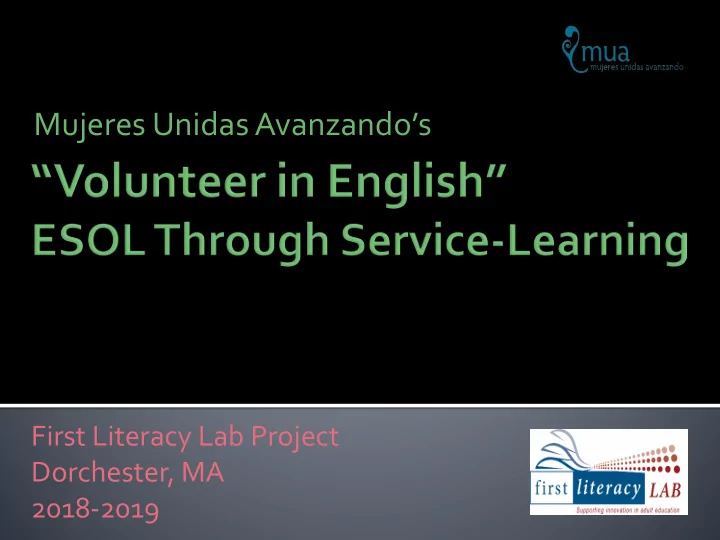

Mujeres Unidas Avanzando’s First Literacy Lab Project Dorchester, MA 2018-2019
Adult Education Center in Dorchester Started in 1979: Happy 40 th Birthday, MUA! Day program is open to all women; New night program is open to women and men Two main programs: ESOL (three levels) and Hi-SET Exam Preparation (in Spanish) Additional programs: Computer Trainings, Healthcare Trainings (Home Health Aide and Phlebotomy), Citizenship Preparation, social services, on-site child care, career coaching, workshops, etc.
First-generation immigrant women and men Primarily Hispanic, but not exclusively! Majority low-income Majority parents (many, single parents) Most in the 20-50 year age range
1. Civic Engagement 2. English Development 3. Resource Education 4. Skill-Building
2 sections of ESOL III: One taught by me, Caitie, and the other by our NAIP AmeriCorps service member, Stazi
Stazi and I met to develop a calendar of in-class discussion topics and external service-learning sites These topics and projects were intended to supplement, not replace, the existing ESOL III curriculum Main focus: How can we connect global social issues to our lives in Boston and which of these issues are most important to our students? How can we make their ESOL education as relevant to their individual experiences as possible?
Some of our ideas included: ESOL III Topic: Housing - Issues: Homelessness; Housing insecurities; Income disparities; Low-income housing options - Service-Learning Site: Cradles to Crayons ESOL III Topic: Health & Nutrition - Issues: Food scarcity and food waste; Hunger; Low-income healthy food options; Food resources in Boston - Service-Learning Site: The Daily Table; Greater Boston Food Bank; Community Servings ESOL III Topic: Civics - Issues: Our role and our agency in the community; Civic responsibility; Environmental issues; Civil rights and inequality - Service-Learning Site: MUA (on-site clean-up); Local community garden or park clean-up
How do we introduce a concept so large as the idea of “service learning”? Furthermore, how do we get our students excited about it?
We found a “Service Learning Lesson Plan” online from Purdue University that helped us develop a framework for introducing this concept to our students https://extension.purdue.edu/4h/Documents/Volunte er%20IN%204-H%20Toolkit/Service- learning%20Lesson%20Plan.pdf Our main take-aways: How is service learning different from standard volunteering; Three types of service learning: “direct service, indirect service, advocacy”; How to identify and execute a project
Much to our relief, our students were really excited about it from the beginning! We asked them to discuss in pairs: “Why could service learning be beneficial to you?” Without prompting from Stazi or me, they themselves mentioned all four of our project goals: Good English practice; Learn more about resources in Boston; Advocate for change for my community; Learn more skills (and they added my personal favorite: “Helping others is the right thing to do!”) We asked them to brainstorm projects or areas where they would be interested in serving: Many of their ideas overlapped with my and Stazi’s initial outline These are the ones we decided to focus on most closely
Timing: We knew we were planning for probably too much for one academic year, and we did not have enough time to do as much as we would have liked; a lot had to get cut as the year progressed Logistics: Students having to leave at 12 PM to go straight to work; Child care scheduling; Transportation Winter: We lost some class days to snow, but we were also forced to cancel some external opportunities due to the freezing temperatures Two Groups: We weren’t planning on having this project involve two classes, and we often ran into planning conflicts based on our students’ strengths and weaknesses and our pace at progressing through the curriculum
My group: Weaker in speaking and listening; Able to leave MUA during class time (no child care conflicts); Able to carpool; Eager to learn more about Boston and its resources We went out to the community for service projects and the students practiced speaking in authentic situations Stazi’s group: Weaker in reading and writing; Most were unable to leave MUA during class time due to child care; Strong speakers and very passionate about current event topics She focused more on in-class discussions, readings, vocabulary development, and she developed a special unit focused on the Civil Rights Movement and its impact on contemporary U.S. culture
Continue to incorporate these lessons and social issues into the ESOL III curriculum: Stazi and I both noticed a peak in students’ interest when they could connect the class content to issues that affect their lives (food banks, affordable housing, immigrant rights, etc.) Continue partnerships with local organizations such as the Daily Table and GBFB
Johannah Malone, Co-Director: johannahmalone@gmail.com Caitie Shalvey, Lead ESOL Instructor: cjshalvey17@gmail.com www.muaboston.org www.facebook.com/muadorchester 617-282-3500
A very sincere thank you to First Literacy for their support for this project And thank you all for your attention today!
Recommend
More recommend